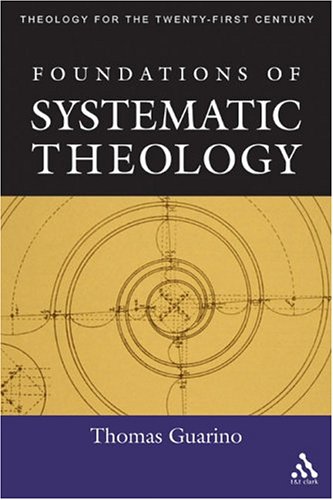Product desciption
Foundations Of Systematic Theology Thomas G Guarino by Thomas G. Guarino 9780567029805, 0567029808 instant download after payment.
In broad outline, salvation history speaks of a just and compassionate God who guides and accompanies the terrestrial people of Israel and who, in the fullness of time, sends his only begotten Son both to save a sinful humanity and to further share with them his own inner life. This narrative of terrestrial salvation, not precluding others applied to past, present and future extraterrestrial contexts wherein bodily-circumstanced souls could be deemed responsible of tyheir own acts, may be read as a love story: One of a God who not only redeems his creatures from sin, but who, through the cross and resurrection of Christ, triumphs entirely over the hectoring effects of evil: suffering, tragedy, humiliation, and death.
The "beauty"of doctrine is a beauty of balance and clarity, of intelligibility and aesthetic proportion. It is a form meant to mediate the splendor of revelation, the immanent and economic life of the Father, the Incarnate Word, and the Holy Spirit. Etienne Gilson, relying on Aquinas, helps us to appreciate the precise nature of doctrinal form: In what does Beauty consist? It consists of integrity, proportion, harmony, brightness and clarity. "Indeed, everything is beautiful as having a form ... and this form is a sort of participation of the divine clarity."
The author argues in this book that the doctrinal form of the Christian faith, in its essential characteristics, calls for certain theoretical exigencies. This is to say that the proportion and beauty of the form is not served or illuminated by simply any presuppositions. Rather, a determinate understanding of first philosophy, of the nature of truth, of hermeneutical theory, of the predication of language and mutual correlation is required if Christian faith and doctrine are to maintain a recognizable and suitably mediative form. Failing to adduce specific principles will lead either to a simple assertion of Christian truth, in which case the form of Christianity becomes less intelligible and attractive—or one will substitute a radically changed form, which is itself inappropriate for displaying the fundamental revelatory narrative of faith.
The house of Christian faith possesses a certain proportion of structure; the form will sag badly if one removes an undergirding item, or if one beam is replaced with another of variable shape or size. The form’s beauty will either be obscured, no longer clearly visible, or the form will become something quite different, no longer architectonically related to what was originally the case.
The intention of this book is to discuss those doctrinal characteristics considered fundamental to the Christian faith, as protective of its revelatory form and, concomitantly, to examine the theoretical principles required if such form is to remain both intelligible and beautiful.
Prof. Guarino writes as a Roman Catholic theologian (with serious ecumenical interests), committed to the truth of the Christian faith, asking to what extent this faith, given its own proportional structure, requires certain fundamental exigencies.


